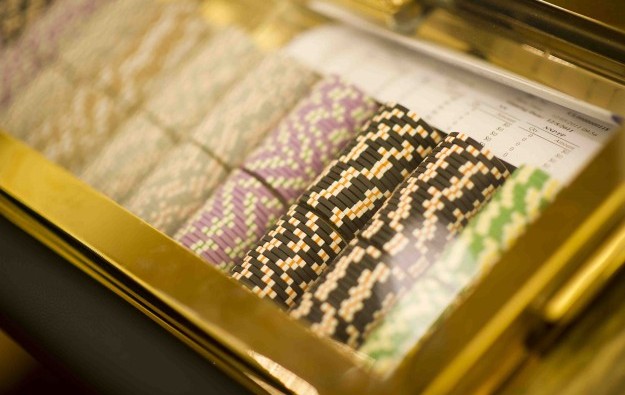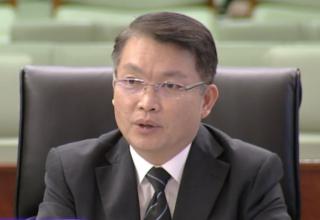Macau’s junket model broken ‘for now’: LVS executive
Sep 10, 2015 Newsdesk Latest News, Macau, Top of the deck

The gambling junket business model as applied to Macau is broken “for now”, says a senior industry executive.
Rob Goldstein, president and chief operating officer of Las Vegas Sands Corp, parent of Macau casino operator Sands China Ltd, was responding to questions during the Bank of America Merrill Lynch 2015 Gaming and Lodging Conference for investors, held in New York on Wednesday.
“I don’t have a lot of confidence in the VIP [segment in Macau] because I think the junket model – for now – is broken,” said Mr Goldstein, who is also interim president and executive director of Sands China.
Deutsche Bank AG said in a note on September 1 that “at least eight” Macau VIP gambling junket rooms had closed in August, but didn’t mention them by name. A trend of junket closures has been seen recently in Macau. Investment analysts have linked it with a dramatic decline in gambling revenue from Chinese customers; particularly in the VIP segment.
“I can’t envision the VIP getting back to the full throttle of a year ago – and for numerous factors,” stated Mr Goldstein.
He said they included “the AML [anti-money-laundering] situation, money movement, economics,” references respectively to Chinese central government policy and to slowing in China’s general economy.
Brokerage Wells Fargo Securities LLC said in a note last week it had heard bearish views expressed about Macau VIP gambling after meetings in Las Vegas with senior executives from casino firms with Macau operations.
But Mr Goldstein noted during Wednesday’s conference: “Cycles come and cycles go. It would be crazy to sit here and write anything off.”
Though he added: “It’s hard for me to see a catalyst to make VIP get strong again. It resides with consumer confidence and consumers’ ability to earn the cash. That’s going to take a while to rebuild.”
The Macau government produces official figures on the split between casino gross gaming revenue (GGR) for VIP baccarat – the game of choice for Chinese high rollers – and the mass market segment, on a quarterly basis, several weeks after the end of each quarter. The data for the second quarter showed VIP baccarat GGR fell 42.2 percent year-on-year, while mass-market GGR, including slots and electronic table games, fell by 30.2 percent year-on-year.
“The confidence of that level of consumer at the very high end, I think that is probably [the most] fragile of any of the [customer] segments, because of the real estate, the equities, the currency devaluation,” said Mr Goldstein, referring to China’s underlying economy.
The executive added: “I don’t think anyone in China – no matter how rich or poor they may be – is unaffected by consumer confidence right now.”
“The stability of the mass segment is critical to us – premium mass can move down rather quickly,” he noted, referring to a customer segment mainly playing table games for higher stakes but in cash rather than on credit, and normally at lower minimum bets than VIP punters.
Defensive pick
Japanese brokerage Nomura advised in a Tuesday note that investors concentrate on the more “defensive” Macau names, naming Sands China as an example.
Sands China gained 150 basis points of GGR share month-on-month in August, maintaining top spot in the GGR league table, according to industry data compiled by GGRAsia.
Mr Goldstein conceded in his Wednesday remarks that there had been an “incredible 12-month cycle of pushback” market-wide in Macau.
“Be it smoking, visas, or UnionPay… there’s been nothing but bad news coming out of Macau since last summer,” he stated, referring firstly to a tabled bill to ban smoking in Macau casinos that is currently under discussion; secondly to a period of tightening that had been applied to conditions for mainland China citizens using transit visas to get to Macau; and thirdly to reports of increased scrutiny of money movements from the mainland to Macau using the China UnionPay Ltd electronic transfer system.
But Mr Goldstein said that in the long term he was sure that the Macau and mainland China authorities had as much interest in seeing Macau succeed as do investors.
‘I believe the government, once it sees Macau prosper on their terms… [will] want to see social stability. And our business model, which is predicated on lots of retailing, [as well as] lots of gaming… will prove to be the best model.”
He added: “A model built on the very, very high end is more troubling right now.”
Mr Goldstein said the firm was sticking to the “fundamentals” and its strength in serving mass-market gamblers, general tourists and convention and concert attendees.
Sands China’s adjusted earnings before interest, taxation, depreciation and amortisation for the first six months were just under US$1.1 billion, a decrease of nearly 37 percent on the year-prior period.
Mr Goldstein stated on Wednesday: “We still think our model works today, worked yesterday; it just worked better a year ago.”
He noted: “We’re going [as an industry] through a bad cycle; that’s not deniable. No one with common sense can be [anything] but appalled by what happened in the last 12 months.
“Macau has had a tough year but we are still bullish on its future prospects. It remains the best gaming [investment] opportunity in the world today,” added Mr Goldstein.
Sands China currently operates three casino resorts on Cotai and one on Macau peninsula, The firm is building a new one on Cotai, the US$2.7-billion The Parisian, featuring a half-scale model of the Eiffel Tower.
Related articles
-
 Weak China demand to dim GEN Singapore...
Weak China demand to dim GEN Singapore...Nov 08, 2024
-
 Added disruption in 4Q amid Londoner...
Added disruption in 4Q amid Londoner...Oct 24, 2024
More news
-
 GKL provides its new table game...
GKL provides its new table game...Nov 22, 2024
-
 The Baron Upright, a new cabinet from...
The Baron Upright, a new cabinet from...Nov 22, 2024
Latest News
Nov 22, 2024
Casino operator Grand Korea Leisure Co Ltd (GKL) says it has achieved its first commercialisation of a new-to-market table game, developed via an in-house competition dating to 2021. Grand Korea...Sign up to our FREE Newsletter
 (Click here for more)
(Click here for more)
Pick of the Day
”As we navigate the final steps of the licensing process, we remain confident in our ability to align with Brazil’s regulatory requirements”
Eusebio Tanco
Chairman of DigiPlus Interactive
Most Popular
 Macau to get 36mln visitors in 2025: Secretary Lei November 21, 2024
Macau to get 36mln visitors in 2025: Secretary Lei November 21, 2024  Gaming technology firm IGT reports hacking incident November 21, 2024
Gaming technology firm IGT reports hacking incident November 21, 2024  US$30bln 2025 GGR target achievable for Macau: CE November 19, 2024
US$30bln 2025 GGR target achievable for Macau: CE November 19, 2024  Marina Bay Sands projects 40pct EBITDA leap post extension November 20, 2024
Marina Bay Sands projects 40pct EBITDA leap post extension November 20, 2024  Macau big-event outdoor venue gets trial run Dec 28: CE November 20, 2024
Macau big-event outdoor venue gets trial run Dec 28: CE November 20, 2024









